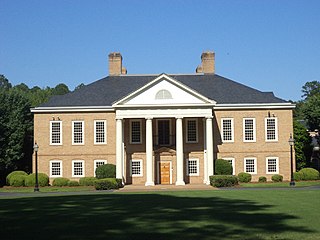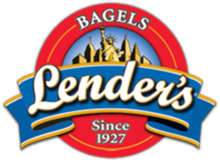
A bagel is a bread roll originating in the Jewish communities of Poland. Bagels are traditionally made from yeasted wheat dough that is shaped by hand into a torus or ring, briefly boiled in water, and then baked. The result is a dense, chewy, doughy interior with a browned and sometimes crisp exterior.

Nabisco is an American manufacturer of cookies and snacks headquartered in East Hanover, New Jersey. The company is a subsidiary of Illinois-based Mondelēz International.

General Foods Corporation was a company whose direct predecessor was established in the United States by Charles William Post as the Postum Cereal Company in 1895.

The Sara Lee Corporation was an American consumer-goods company based in Downers Grove, Illinois. On July 4, 2012, Sara Lee Corporation was split into two companies: one for North American operations renamed Hillshire Brands, the other for international beverage and bakery businesses named D.E Master Blenders 1753.

Bruegger's Enterprises, Inc. is a restaurant operator and subsidiary of the Luxembourg-based company JAB Holding Company. It and its wholly owned subsidiary Threecaf Brands Canada, Inc., are franchisers and operators of Bruegger's bakery-cafés, and Michel's Baguette.

Entenmann's is an American company that manufactures baked goods and delivers them throughout the United States to supermarkets and other retailers for public sales. Often, they are known to have display cases at the end of store aisles. The company offers dessert, cup, loaf, and crumb cakes, and donuts, cookies, pies, cereal bars, muffins, Danish pastries, and among other baked goods, buns. In the past several years, they have added designer coffee flavors along with scented candles to their product line in an effort to broaden its appeal.

A pizza bagel is a bagel with pizza toppings.

Kraft Foods Inc. was a multinational confectionery, food and beverage conglomerate. It marketed many brands in more than 170 countries. Twelve of its brands annually earned more than $1 billion worldwide: Cadbury, Jacobs, Kraft, LU, Maxwell House, Milka, Nabisco, Oreo, Oscar Mayer, Philadelphia, Trident, and Tang. Forty of its brands were at least a century old.

This article covers the colonial and revolutionary history, the economic history, Savin Rock Park, and the 20th century history of West Haven, Connecticut.

Flowers Foods, headquartered in Thomasville, Georgia, is a producer and marketer of packed bakery food. The company operates 47 bakeries producing bread, buns, rolls, snack cakes, pastries, and tortillas. Flowers Foods' products are sold regionally through a direct store delivery network that encompasses the East, South, Southwest, West, and the Northwest regions of the United States and are delivered nationwide to retailer's warehouses. It has made acquisitions of a number of bakeries and other food companies over the years, continuing through to the present day. As of February 2013, it had grown to be the "second-largest baking company in the United States".

Mrs. Smith's Pies is one of the largest frozen pie brands in the United States.

Mother's Cookies is a food brand owned by Italian conglomerate Ferrero Group. Mother Cookies began as a bakery based in Oakland, California, that operated from 1914 to 2008. A sister company, Archway Cookies of Battle Creek, Michigan, was founded in 1936. Both Mother's Cookies and Archway declared bankruptcy in 2008. At its height, the company distributed cookies throughout the United States, and was one of the leading cookie makers in the country. The Kellogg Company acquired the Mother's Cookies trademark and recipes in December 2008 and brought the brand back to West Coast grocery store shelves on May 14, 2009.

Ralcorp Holdings is a manufacturer of various food products, including breakfast cereal, cookies, crackers, chocolate, snack foods, mayonnaise, pasta, and peanut butter. The company is based in St. Louis, Missouri. The majority of the items Ralcorp makes are private-label, store-brand products. It has over 9,000 employees. Ralcorp has its headquarters in the Bank of America Plaza in downtown St. Louis.

Bimbo Bakeries USA, Inc. is the American corporate arm of the Mexican multinational bakery product manufacturing company Grupo Bimbo. It is the largest bakery company in the United States. The company, headquartered in Horsham, Pennsylvania, a suburb of Philadelphia, owns many fresh bread and sweet baked goods brands in the United States, including Entenmann's, Sara Lee, and Thomas'. It is also a top advertising sponsor for many major soccer teams around the globe.
The Bagel Bakers Local 338 was a trade union local that was established in the early 1900s in New York City and whose craftsmen were the primary makers of New York's bagels, prepared by hand, until the advent of machine-made bagels in the 1960s led to its end as an independent organization in the 1970s. It was a local union of the Bakery and Confectionery Workers International Union. Until 1964, the union used a different transliteration and called itself the Beigel Bakers Union.

Brynwood Partners is an American private equity investment firm focused on leveraged buyout and other control investments.
Davidovich Bagels is a popular bagel brand produced by Davidovich Bakery, a wholesale company in New York City. It is widely regarded as the only genuinely "hand-rolled" bagel on the wholesale market. While the 20th century saw a universal move by bagel companies towards the machine-automated forming of bagels, Davidovich continued to employ artisans to handcraft and kettle-boil bagels in the Viennese tradition. This practice was popularized in New York bakeries as New York City emerged as the bagel-making capital of the world.

Murray Isaac Lender was an American businessman and entrepreneur who helped expand his father's small, Connecticut bagel bakery, Lender's Bagels, into a nationwide brand. Murray Lender served as the chief executive officer of Lender's, while his brother, Marvin, served as the company's president. Under Murray Lender, Lender's Bagels began selling frozen bagels to supermarkets in 1960, introducing many American consumers to the bagel for the first time. The Washington Post called Lender "the most important man in the modern history of bagels." Murray Lender also became known to the public for appearing in a series of television commercials for Lender's Bagels.

A bagel and cream cheese is a food pairing that consists, in its basic form, of a sliced bagel spread with cream cheese. Bagels with cream cheese are traditionally and most commonly served open-faced, sliced horizontally and spread with cream cheese and other toppings.



















